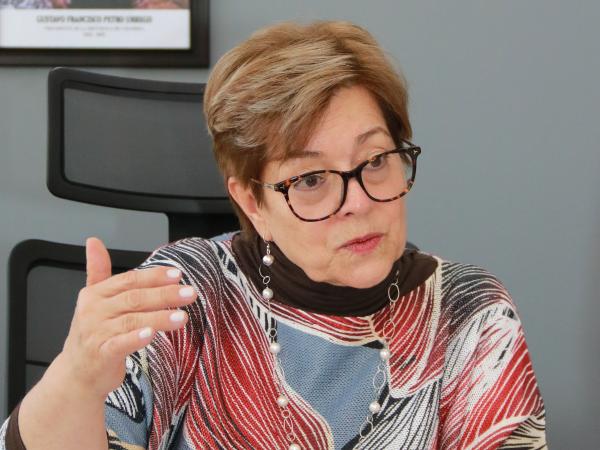Gloria Inés Ramírez, the Minister of Labor, today commands two of the great reforms that the Government of Gustavo Petro has: pension and labor. The head of the portfolio has on her shoulders the task of reforming a large part of the social security system, and she has been emphatic in the need for a model that responds to the needs of workers and guarantees their protection in old age.
(‘We want solid companies but without job insecurity’: Mintrabajo).
The Minister spoke with Portafolio about the two projects and addressed the criticism she has received from various fronts.
The Government has already filed the two reforms, what do you expect from the legislative process?
We are waiting for the legislative process and the pertinent debates to pass in the shortest possible time. We are already in the field of the Congress of the Republic and we will be there defending these projects that we have built with many convictions, but above all, with a very good participation.
What is your diagnosis of the Colombian labor market?
It is a labor market that is not yet functional, which shows the failure of the economic development policies that the country has had so far and with the proposals that President Gustavo Petro has, we will surely advance and all our reforms are based on that .
One criticism that the labor reform has received is that it would increase the costs of companies, and therefore would affect formal hiring. Do you think it is a risk?
In 2003 there was a reform here, with Law 789, which lowered labor costs and supposedly would generate employment and end informality. But neither of those two things happened. What is clear about this is that, effectively, lowering labor costs does not overcome informality or increase employment.
(Mintrabajo investigates reports of cases of labor and sexual abuse).
So we have to look for other alternatives, which are the ones that the Government is proposing: as a different development for the country in the first instance, with industrialization, with the countryside as a motor of development, accompaniment of associativity, of the solidarity economy and popular, a clear dynamic of the General Budget of the Nation, and in addition to this, a microcredit policy that effectively attacks the ‘drop by drop’ that does so much damage to microenterprises in this country.
Some experts have said that the reform focuses a lot on those who are already formal, even on ‘insider unionism’. What approach is there for the unemployed and the informal?
The labor reform does not seek anything other than the application of the National Political Constitution. Article 25 says that in Colombia work is a fundamental right, but it also says that it must be guaranteed regardless of the modality it assumes; we have article 48 that talks about Social Security and likewise article 53, about the principles of an employment relationship.
What we are here is adjusting to the jurisprudence that is already on the part of the Constitutional Court, as well as clearly regarding international conventions and the recommendations that the ILO has made to us.
What is there, the guarantees, is not an invention. It is the recognition of rights in general terms, and everything that has to do with collective work is simply the development of articles 54, 55 and 56 of the National Political Constitution and the Court rulings that have already been pronounced. in that sense.
The labor market is not functional yet. It shows the failure of the economic development policies that the country has had so far
In relation to the pension reform, what are the advantages of a pillar system?
The first thing is that it changes a system that today has two parallel regimes, which are in competition and do not fulfill the pension function, to a unified, complementary and guaranteed regime for the citizens of Colombia. We do this through the four pillars.
A solidarity pillar will effectively allow more older adults to have the possibility of a benefit to live that last stage of their life with dignity, this guaranteed with the General Budget of the Nation. A second pillar is the semi-contributory one, which includes people who contribute to the system, but never receive a pension. We are not going to return what they have quoted as it is done today, but we transform it into a life annuity.
(Government filed the pension reform ‘Change for old age’).
The third pillar is the contributory one, where there is a good debate. This is a pillar that strengthens the public system, and we invite all Colombians up to three minimum wages to be listed in Colpensiones and from three minimum wages onwards, the excess will be listed in an individual savings fund. Thus, in a responsible manner with the fiscal rule, we will manage and control a little the pension liabilities and we will guarantee that no Colombian who has that right is left to pay.
Finally, the fourth pillar, the voluntary one, is for all Colombians with the possibility of a higher income and who can contribute to a higher pension, since they will have the pension from the public system plus what they have been able to save.
What other elements of the project stand out?
And we also have a special bonus for women, which is recognition of care for each child raised, and up to three children, that is 50 weeks of recognition in their time of contribution. I think it is a very deep measure, which hopefully we can extend it to much more coverage and we are moving forward.
(Minister of Labor responds to criticism of the labor reform).
No Colombian will have their rights taken away. On the contrary, we will respect the rights acquired. There will be a transition period for those who want to transfer to do so voluntarily after having received double counselling. And finally, people’s savings will not be touched. This will only come to the system when you meet the pension requirements and will be used exclusively for that point.
The AFPs have criticized that they will lose participation with the new scheme since 90% of their affiliates would go to Colpensiones. Is a change in the contributory pillar feasible?
No. We have made a proposal that is totally balanced and in correspondence with the fiscal possibilities of the country. Of course, Asofondos is impacted, because of the people who have there, 83% are in this range of contributions. But this has some compensations, for example, they will manage all the surplus from 3 salaries onwards and they will also have the possibility of Voluntary Savings.
This must be shared, the $360 billion that Asofondos manages today through its portfolios, of which 60% is in banks abroad and the other 40% is in Colombia, it is necessary for the country to know that we need them here to that we produce in investments, more work, more employment and more contributors.
The $360 billion that Asofondos manages today through its portfolios, it is necessary for the country to know that we need them here
Will the savings fund proposed by the reform compensate for the market managed by the funds?
Of course. The reserve that we are placing is precisely to guarantee the system that in the medium term it will have the financial stabilization that will allow it to meet its commitments.
Some study centers, such as Anif, assure that the project would not be fiscally viable, and that the pension liability would double. How can this be financed with a pay-as-you-go system?
In the calculations that Anif makes, two things must be kept in mind. It is true that if affiliates increase from 6 million to 22 million there must be a growth in liabilities. What Anif does not say is that there has to be a different flow of how this liability is going to be unaccumulated, little by little, to the extent that people meet their requirements. But also, we have all the pension bonds, which are still being redeemed. We are expanding a contribution base to the system that will be nourished with all the potential we have of new employees and these new jobs are generated by a different economic development model. Anif starts from the assumption that this is static and that it will not improve.
LAURA LUCIA BECERRA ELEJALDE
BRIEFCASE
















